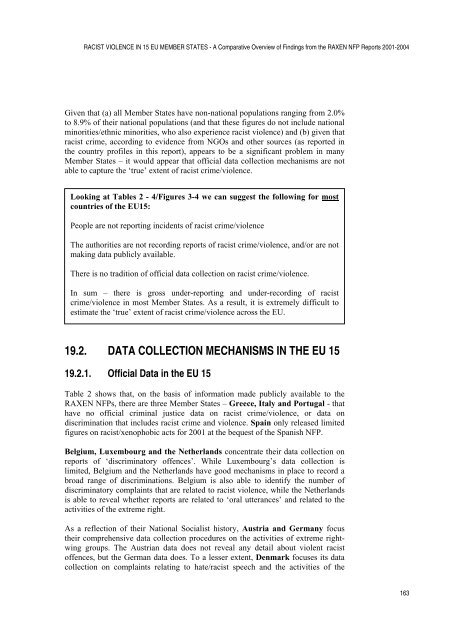RACIST VIOLENCE IN 15 EU MEMBER STATES - Cospe
RACIST VIOLENCE IN 15 EU MEMBER STATES - Cospe
RACIST VIOLENCE IN 15 EU MEMBER STATES - Cospe
You also want an ePaper? Increase the reach of your titles
YUMPU automatically turns print PDFs into web optimized ePapers that Google loves.
<strong>RACIST</strong> <strong>VIOLENCE</strong> <strong>IN</strong> <strong>15</strong> <strong>EU</strong> <strong>MEMBER</strong> <strong>STATES</strong> - A Comparative Overview of Findings from the RAXEN NFP Reports 2001-2004<br />
Given that (a) all Member States have non-national populations ranging from 2.0%<br />
to 8.9% of their national populations (and that these figures do not include national<br />
minorities/ethnic minorities, who also experience racist violence) and (b) given that<br />
racist crime, according to evidence from NGOs and other sources (as reported in<br />
the country profiles in this report), appears to be a significant problem in many<br />
Member States – it would appear that official data collection mechanisms are not<br />
able to capture the ‘true’ extent of racist crime/violence.<br />
Looking at Tables 2 - 4/Figures 3-4 we can suggest the following for most<br />
countries of the <strong>EU</strong><strong>15</strong>:<br />
People are not reporting incidents of racist crime/violence<br />
The authorities are not recording reports of racist crime/violence, and/or are not<br />
making data publicly available.<br />
There is no tradition of official data collection on racist crime/violence.<br />
In sum – there is gross under-reporting and under-recording of racist<br />
crime/violence in most Member States. As a result, it is extremely difficult to<br />
estimate the ‘true’ extent of racist crime/violence across the <strong>EU</strong>.<br />
19.2. DATA COLLECTION MECHANISMS <strong>IN</strong> THE <strong>EU</strong> <strong>15</strong><br />
19.2.1. Official Data in the <strong>EU</strong> <strong>15</strong><br />
Table 2 shows that, on the basis of information made publicly available to the<br />
RAXEN NFPs, there are three Member States – Greece, Italy and Portugal - that<br />
have no official criminal justice data on racist crime/violence, or data on<br />
discrimination that includes racist crime and violence. Spain only released limited<br />
figures on racist/xenophobic acts for 2001 at the bequest of the Spanish NFP.<br />
Belgium, Luxembourg and the Netherlands concentrate their data collection on<br />
reports of ‘discriminatory offences’. While Luxembourg’s data collection is<br />
limited, Belgium and the Netherlands have good mechanisms in place to record a<br />
broad range of discriminations. Belgium is also able to identify the number of<br />
discriminatory complaints that are related to racist violence, while the Netherlands<br />
is able to reveal whether reports are related to ‘oral utterances’ and related to the<br />
activities of the extreme right.<br />
As a reflection of their National Socialist history, Austria and Germany focus<br />
their comprehensive data collection procedures on the activities of extreme rightwing<br />
groups. The Austrian data does not reveal any detail about violent racist<br />
offences, but the German data does. To a lesser extent, Denmark focuses its data<br />
collection on complaints relating to hate/racist speech and the activities of the<br />
163
















